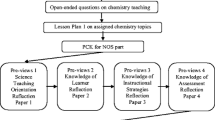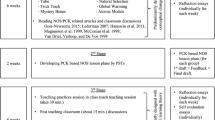Abstract
This paper reports on topic-specific pedagogical content knowledge (PCK) enacted by three pre-service science teachers during their final year school-based internship. An interpretive, qualitative case study was conducted to investigate to what extent the pre-service teachers applied the knowledge taught during a preceding physical science method course, when teaching electromagnetism for the first time. The study is rooted in the revised consensus model of PCK with focus on the enacted PCK (ePCK) of pre-service teachers. Five topic-specific PCK components informed the design of an ePCK rubric used to assess the extent to which the pre-service teachers’ PCK manifested in their practice. Data were captured by written content representations (CoRes), lesson observations and interviews. The rubric, together with further qualitative analysis, was used to determine how the pre-service teachers translated the knowledge taught during training into practice. Findings indicate that the participating pre-service teachers enacted certain components of the taught PCK and reasoned pedagogically about their teaching, though not at the same level for all main ideas in the topic. After teaching the topic, the pre-service teachers indicated that they would like to improve their sequencing of key concepts. It was concluded that the teaching experience contributed to a better understanding of conceptual teaching strategies. The findings of the study may inform PCK development in teacher education.












Similar content being viewed by others
References
Abell, S. K., Rogers, M. A. P., Hanuscin, D. L., Lee, M. H., & Gagnon, M. J. (2009). Preparing the next generation of science teacher educators: a model for developing PCK for teaching science teachers. Journal of Science Teacher Education, 20(1), 77–93.
Alonzo, A. C., & Kim, J. (2016). Declarative and dynamic pedagogical content knowledge as elicited through two video-based interview methods. Journal of Research in Science Teaching, 53(8), 1259–1286.
Alonzo, A. C., Kobarg, M., & Seidel, T. (2012). Pedagogical content knowledge as reflected in teacher–student interactions: Analysis of two video cases. Journal of Research in Science Teaching, 49(10), 1211–1239.
Baxter, J. A., & Lederman, N. G. (1999). Assessment and measurement of pedagogical content knowledge. In Examining pedagogical content knowledge (pp. 147–161). London: Kluwer Academic Publishers.
Carlson, J., & Daehler, K. R. (2019). The refined consensus model of pedagogical content knowledge in science education. In Repositioning Pedagogical Content Knowledge in Teachers’ Knowledge for Teaching Science (pp. 77–92). Berlin: Springer.
Chan, K. K. H., Rollnick, M., & Gess-Newsome, J. (2019). A grand rubric for measuring science teachers’ pedagogical content knowledge Repositioning Pedagogical Content Knowledge in Teachers’ Knowledge for Teaching Science (pp. 251-269): Springer.
Cohen, L., Manion, L., & Morrison, K. (2013). Research methods in education (7th ed.). London: Routledge.
Davidowitz, B., & Potgieter, M. (2016). Use of the Rasch measurement model to explore the relationship between content knowledge and topic-specific pedagogical content knowledge for organic chemistry. International Journal of Science Education, 38(9), 1483–1503.
Davidowitz, B., Potgieter, M., & Vokwana, N. (2014). Exploring the relationship between content knowledge of organic chemistry and topic specific PCK. Paper presented at the 22nd annual meeting of the southern African Association for Research in mathematics, Science and Technology Education.
Department of Basic Education. (2011). Curriculum and assessment policy statement physical sciences further education and training grades 10–12. Retrieved from https://www.education.gov.za/Curriculum/CurriculumAssessmentPolicyStatements. Accessed 05 Feb 2019.
Dori, Y. J., & Belcher, J. (2005). How does technology-enabled active learning affect undergraduate students' understanding of electromagnetism concepts? The Journal of the Learning Sciences, 14(2), 243–279.
Friedrichsen, P. J., Abell, S. K., Pareja, E. M., Brown, P. L., Lankford, D. M., & Volkmann, M. J. (2009). Does teaching experience matter? Examining biology teachers’ prior knowledge for teaching in an alternative certification program. Journal of Research in Science Teaching, 46(4), 357–383.
Gall, M., Borg, W., & Gall, J. (1996). Educational Research An Introduction (6th).
Gess-Newsome, J. (2015). A model of teacher professional knowledge and skill including PCK: results of the thinking from the PCK summit. In A. Berry, P. Friedrichsen, & J. Loughran (Eds.), Re-examing pedagogical content knowledge in science education (pp. 28–42). New York: Routledge.
Geddis, A.N. (1993). Transforming subject‐matter knowledge: the role of pedagogical content knowledge in learning to reflect on teaching. International Journal of Science Education, 15(6), 673–683
Grossman, P. L. (1991). Overcoming the apprenticeship of observation in teacher education coursework. Teaching and Teacher Education, 7(4), 345–357.
Hekkenberg, A., Lemmer, M., & Dekkers, P. (2015). An analysis of teachers’ concept confusion concerning electric and magnetic fields. African Journal of Research in Mathematics, Science and Technology Education, 19(1), 34–44.
Henze, I., van Driel, J. H., & Verloop, N. (2008). Development of experienced science teachers’ pedagogical content knowledge of models of the solar system and the universe. International Journal of Science Education, 30(10), 1321–1342.
Henze, I., & Van Driel, J. H. (2015). Toward a more comprehensive way to capture PCK in its complexity. In A. Berry, P. Friedrichsen, & J. Loughran (Eds.), Re-examing pedagogical content knowledge in science education (pp. 120–134). New York: Routledge.
Jelicic, K., Planinic, M., & Planinsic, G. (2017). Analyzing high school students’ reasoning about electromagnetic induction. Physical Review Physics Education Research, 13(1), 010112.
Kaya, O. N. (2009). The nature of relationships among the components of pedagogical content knowledge of preservice science teachers: ‘ozone layer depletion’ as an example. International Journal of Science Education, 31(7), 961–988.
Kind, V. (2009). Pedagogical content knowledge in science education: perspectives and potential for progress. Studies in Science Education, 45(2), 169–204.
Kirschner, S., Taylor, J., Rollnick, M., Borowski, A., & Mavhunga, E. (2015). Gathering evidence for the validity of PCK measures. In A. Berry, P. Friedrichsen, & J. Loughran (Eds.), Re-examining pedagogical content knowledge in science education (p. 229). New York: Routledge.
Loughran, J., Mulhall, P., & Berry, A. (2004). In search of pedagogical content knowledge in science: developing ways of articulating and documenting professional practice. Journal of Research in Science Teaching, 41(4), 370–391.
Magnusson, S., Krajcik, J., & Borko, H. (1999). Nature, sources, and development of pedagogical content knowledge for science teaching. In Examining pedagogical content knowledge (pp. 95–132). Berlin: Springer.
Maloney, D. P., O’Kuma, T. L., Hieggelke, C. J., & Van Heuvelen, A. (2001). Surveying students’ conceptual knowledge of electricity and magnetism. American Journal of Physics, 69(S1), S12–S23.
Mavhunga, E. (2014). Improving PCK and CK in pre-service chemistry teachers. In Exploring Mathematics and Science Teachers’ Knowledge: Windows Into Teacher Thinking (p. 31). London: Routledge.
Mavhunga, E. (2018). Revealing the structural complexity of component interactions of topic-specific PCK when planning to teach. Research in Science Education, 1-22.
Mavhunga, E. (2019). Exposing pathways for developing teacher pedagogical content knowledge at the topic level in science Repositioning Pedagogical Content Knowledge in Teachers’ Knowledge for Teaching Science (pp. 129-148): Springer.
Mavhunga, E., & Rollnick, M. (2013). Improving PCK of chemical equilibrium in pre-service teachers. African Journal of Research in Mathematics, Science and Technology Education, 17(1-2), 113-125.
Mavhunga, E., & Rollnick, M. (2017). Implementing PCK Topic by Topic in Methodology Courses. Designing and Teaching the Secondary Science Methods Course (pp. 149-170): Brill Sense.
Mazibe, E. N. (2017). Teaching graphs of motion: translating pedagogical content knowledge into practice. Pretoria: (MEd Dissertation), University of Pretoria.
Nilsson, P. (2008). Teaching for understanding: the complex nature of pedagogical content knowledge in pre-service education. International Journal of Science Education, 30(10), 1281–1299.
Nilsson, P., & Loughran, J. (2012). Exploring the development of pre-service science elementary teachers’ pedagogical content knowledge. Journal of Science Teacher Education, 23, 699–721.
Park, S., & Chen, Y. C. (2012). Mapping out the integration of the components of pedagogical content knowledge (PCK): Examples from high school biology classrooms. Journal of Research in Science Teaching, 49(7), 922–941.
Park, S., & Suh, J. (2015). From portraying toward assessing PCK: drivers, dilemmas and directions for future research. In A. Berry, P. Friedrichsen, & J. Loughran (Eds.), Re-examing pedagogical content knowledge in science education (pp. 104–119). New York: Routledge.
Rollnick, M., Bennett, J., Rhemtula, M., Dharsey, N., & Ndlovu, T. (2008). The place of subject matter knowledge in pedagogical content knowledge: A case study of South African teachers teaching the amount of substance and chemical equilibrium. International Journal of Science Education, 30(10), 1365-1387
Rollnick, M., & Mavhunga, E. (2016). Can the principles of topic-specific PCK be applied across science topics? Teaching PCK in a pre-service programme. In N. Papadouris, A. Hadjigeorgiou, & C. Constantinou (Eds.), Insights from research in science teaching and learning (pp. 59-72). Cham: Springer
Sağlam, M., & Millar, R. (2006). Upper high school students’ understanding of electromagnetism. International Journal of Science Education, 28(5), 543–566.
Shulman, L. S. (1986). Those who understand: knowledge growth in teaching. Educational Researcher, 15(2), 4–14.
Shulman, L. S. (1987). Knowledge and teaching: foundations of the new reform. Harvard Educational Review, 57(1), 1–23.
Van Driel, J. H., De Jong, O., & Verloop, N. (2002). The development of preservice chemistry teachers’ pedagogical content knowledge. Science Education, 86(4), 572–590.
Veal, W. R., & MaKinster, J. G. (1999). Pedagogical content knowledge taxonomies. Electronic Journal of Science Education, 3(4).
Zuza, K., Almudí, J.-M., Leniz, A., & Guisasola, J. (2014). Addressing students’ difficulties with Faraday’s law: a guided problem solving approach. Physical Review Special Topics-Physics Education Research, 10(1), 2–15.
Author information
Authors and Affiliations
Corresponding author
Additional information
Publisher’s Note
Springer Nature remains neutral with regard to jurisdictional claims in published maps and institutional affiliations.
Electronic supplementary material
ESM 1
(DOCX 18.5 kb)
Rights and permissions
About this article
Cite this article
Coetzee, C., Rollnick, M. & Gaigher, E. Teaching Electromagnetism for the First Time: a Case Study of Pre-service Science Teachers’ Enacted Pedagogical Content Knowledge. Res Sci Educ 52, 357–378 (2022). https://doi.org/10.1007/s11165-020-09948-4
Published:
Issue Date:
DOI: https://doi.org/10.1007/s11165-020-09948-4




